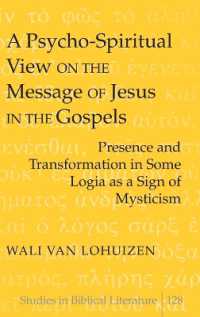- ホーム
- > 洋書
- > 英文書
- > Philosophy
Full Description
Roberto Esposito's poetic and historically layered new book draws on a famous, and famously opaque, passage from the Old Testament to shed light on the vision of self and domination that has profoundly shaped western identity and left its mark on western culture.
These ten lines from Genesis tell the tale of Jacob wrestling with a mysterious adversary on a riverbank. But who exactly is Jacob wrestling with - the divine? Evil personified? Absolute otherness? Or his deepest, most subconscious self, repressed and projected? Who, in other words, is the adversary, and what is the enigmatic conflict that binds the two in perpetual conflict? Interchangeable and yet never resolved, these entwined adversaries speak to our great desire to come face to face with personal truth, even if only for an instant, while coming to terms with its impermanence.
Casting a wide net, Esposito connects his reading of Jacob and the Angel to the fundamental relationship between self and adversary inherited by the modern West and explores the extraordinary influence this story has had on western culture, from philosophy and theology to literature, politics and art.
Contents
List of Illustrations
Preface
I.The Enigma
II. The Reader
III. Twins
IV. Deception
V. The Duel
VI. The Wall
VII. The Angel
VIII. The Demon
IX. The Enemy
X. The Shadow
Glosses
Notes
-

- 電子書籍
- 引きこもりご令嬢~真人間改造日記【タテ…
-

- 電子書籍
- 蕎麦春秋Vol.66






